Reflections from the OSIRIS Team at the World Conference on Research Integrity
The 8th World Conference on Research Integrity (WCRI) was hosted in Athens, Greece, on June 2-5, 2024. The OSIRIS Consortium was well represented at the conference which was followed by the OSIRIS-TIER2-iRISE tripartite partnership general assembly. We’ve asked the attending OSIRIS members to pick a session they found particularly interesting or valuable and highlight some work presented by the Consortia.
OSIRIS Presentations
Two OSIRIS team members were involved in sessions at WCRI:
Nick DeVito from the University of Oxford gave an oral presentation detailing the promise and utility of clinical trial registries and where these aspirations sometimes fall short. Nick was joined by his frequent collaborator, and iRISE team member, Maia Salholz-Hillel from the QUEST Center in Berlin, for the presentation. The presentation concluded with some key learnings about clinical trial registration that can be applied to preregistration across any discipline. A copy of the presentation is available here.
Florian Naudet from the University of Renne led a symposium session on responsible clinical trial data sharing practices. The session included talks from four speakers exploring the ethics, practice, and future of data sharing for clinical trials, a complex area with major implications for reproducibility in the medical field. You can read Florian’s recap of the session here
Conference Highlights
Members of the OSIRIS Consortium were eager to share their highlights from the conference so we asked each member to reflect on a session or presentation they found particularly interesting!
Cinzia Colombo – Mario Negri Institute for Pharmacological Research: My favourite was the Symposium “A policy agenda to address industry influence on research integrity” by Marc-Andre Gagnon, Scott Graham, Andreas Lundh, Lisa Parker, chaired by Quinn Grundy. In particular, the talk by Marc-Andre Gagnon about corporate capture in the biopharmaceutical sector, including scientific, professional, technological, regulatory, market, and civil society capture. Among the main take-home messages presented by Gagnon: the objective of corporations is not to produce knowledge but to control the scientific narratives; corporations can choose to do bad science and disinformation, mostly good but cherry-picked science, good science with other bias such as the domination of research agenda based on financial incentives (making some voices more dominant); and creating institutionalized regimes of ignorance. He concluded that research integrity is wrong to focus only on the quality of the research while other systematic biases are corrupting science. I would have liked these issues to be discussed in a plenary with all participants
I also really liked the plenary on the racial and ethnic bias, it gave me many critical insights to think about.
Magdalena Kozula – KU Leuven: The presentation I liked the most at WCRI was “Putting Research Integrity on the Map: Understanding Dynamics of Responsibility Across European Research Integrity Policies” by Rachel Fishberg (co-authors Serge P J M Horbach, Emer Brady, Lise Degn). Inspired by the recent institutional emphasis on promoting RI, this study explored how integrity and related concepts are framed across Europe at the institutional level. Fishberg and colleagues analyzed policy documents from all EU countries, coding them into themes such as Ethics, Integrity, Misconduct, Open Science, Data, and Quality, and investigated the infrastructure supporting RI in each country. This approach highlighted the discrepancies and commonalities in policy formulations. I appreciate how this work enhances our understanding of local translations and variations in RI policies, constructing a comprehensive picture of how different contexts assign responsibility for fostering and supporting RI norms and values, thereby informing better policy-making.
Ayu Dewi – Amsterdam UMC: My favourite presentation was ‘A taxonomy of scholarly disinformation to enhance research integrity‘ by Leslie Mcintosh and William White. The framework they have crafted is like a map, helping us understand who’s involved and how it spreads, including the issue of non-reproducibility in scientific results. I find this presentation confirms my belief that disinformation is a real reason why open science should be promoted.

Veerle Van den Eynden – Ku Leuven: I want to share 2 highlights:
The opening plenary by Prof. Jan Helge Solbakk, University of Oslo, was quite a philosophical talk and, at times farfetched in making the connection between research excellence, integrity and Oedipus, but there was one thing he said that was very relevant: If something goes wrong in research without the researcher intending to do harm, then the researcher him/herself should take responsibility for this, own up to the harm done and take action (like Oedipus didn’t mean to kill his father, but took responsibility for it), rather than others pointing the finger.
The plenary presentation by Joeri Tijdink from our sister project TIER2, “The Future(s) of reproducibility from different disciplinary contexts” Joeri gave a nice overview of the multiple drivers from research culture and stakeholders that motivate researchers to practice reproducible research, or that change behaviour towards reproducible research.
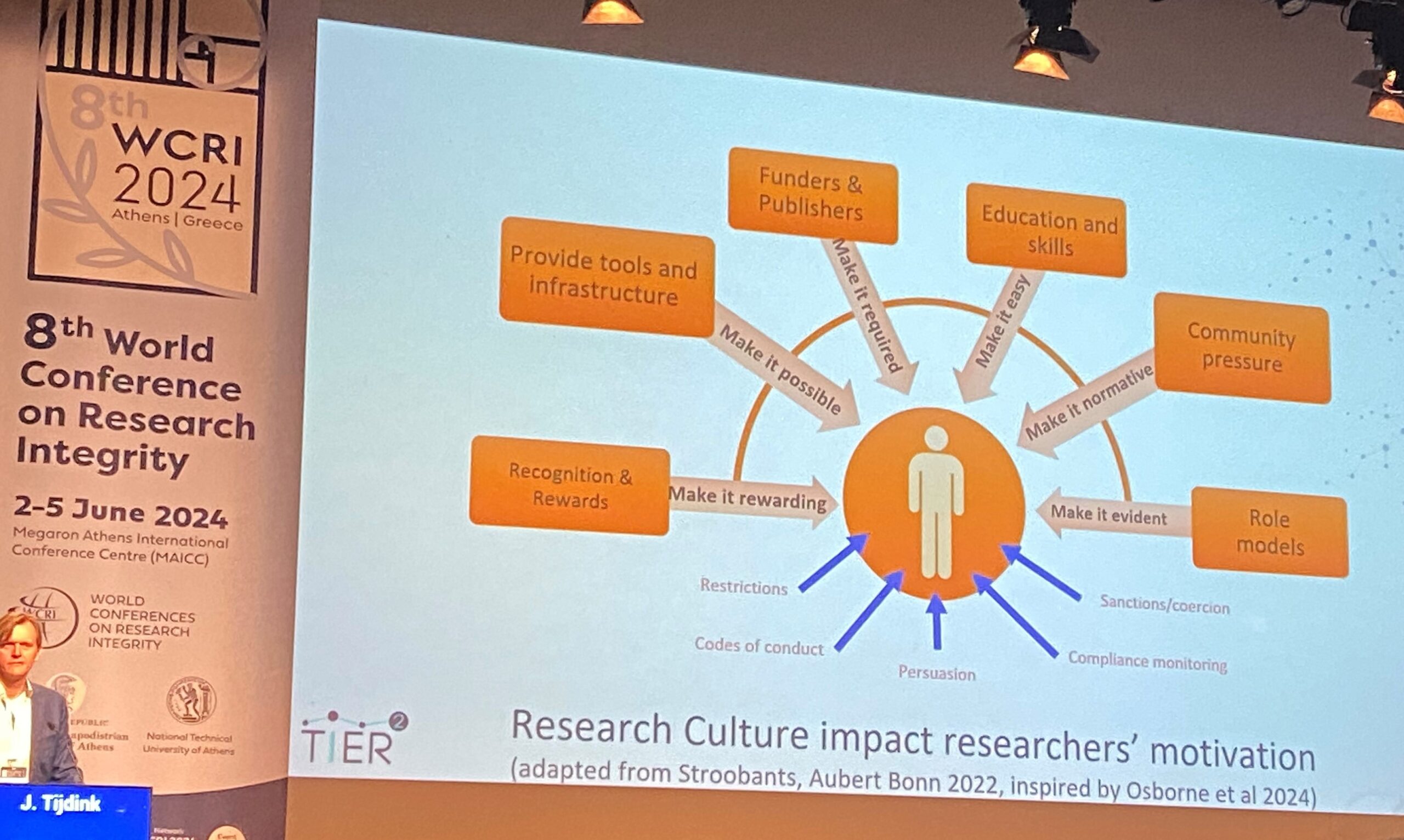
Mariska Leeflang – Amsterdam UMC: I found the presentation by Ben Mol on the 4th of June most impressive, although I would not want to call it my “favourite”… Ben discovered a strange table containing even numbers only in a manuscript; then he found a second paper by the same author team, with exactly the same table and similar numbers of in- and excluded patients. This finding led to a huge undertaking in which Ben and his team have checked almost 1000 manuscripts for fraud. The most disheartening was the long time it takes before a journal retracts a fraudulent paper. As Ben said: everyone benefits from these papers, the authors have a publication, journals have output, and fraud-detective can show their effectiveness. Only the patients do not benefit – the harm caused by these papers is on them.
Patrick Onghena – KU Leuven: For me the highlight was the Steneck-Mayer lecture by John Ioannidis. I never met him in person, and I was very curious to hear his thoughts on “Reproducible research: Progress made across disciplines” nearly 20 years after “Why Most Published Research Findings Are False”. I found the presentation to be very well structured, informative, and entertaining. However, it crossed my mind that “Why Most Published Research Findings Are False” was published in 2005 as a research finding. Can we ever refute Ioannidis’s claim?
Rita Banzi – Mario Negri Institute for Pharmacological Research: My favourite session was obviously the one chaired by Florian, but I will comment on the Ioannidis lecture. Very inspirational lecture as usual, starting from the disclosures slide: “My main conflict of interest is that I am studying biases therefore it is likely that I am biased”. Acknowledging that science is becoming more massive and complex, Ioannidis stated that even if single fields improve reproducibility over time the total universe may get worse if dark matter increases and/or if the least reproducible fields grow at a faster pace.
Among different examples of “dark matter”, I particularly appreciated the research practice on big data (including AI). Threats to good science here include issues with sample sizes, cherry-picking of hypotheses, post hoc analyses, idiosyncratic statistical inference tools, lack of registration and suboptimal data sharing. Ioannidis also commented on the status of reproducibility. Reproducibility of methods is increasing in some fields but maybe not necessarily those that produce many papers; reproducibility of results is still unknown in many (or most) field as most papers are not replicated; reproducibility of inferences it is challenging and one may wonder whether it’s even possible or worthwhile to improve. The final part on re-engineering the reward system in research made me feel a bit frustrated, again, as usual.
Who can take the lead when we are sawing off the branch we are sitting on?
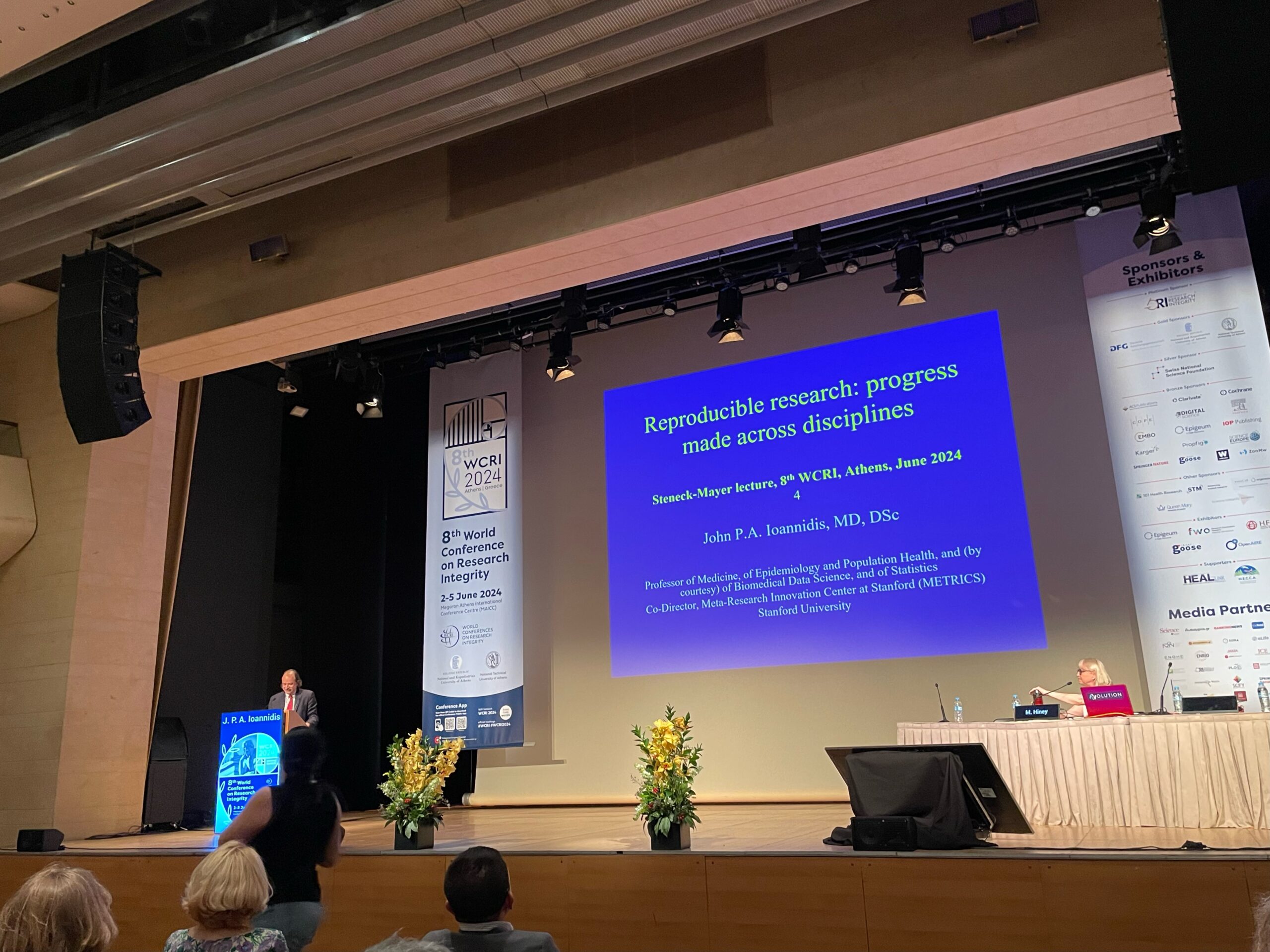
Florian Naudet – University of Rennes: My favorite was the “Pre-conference Workshop 2 : Assessing publication research integrity – understanding the key techniques“. We learned a lot of interesting stuff in order to detect fraudulent preclinical and clinical studies. It was a full day of teachings with 4 stellar speakers who shared their expertise with a very receptive audience. It encompassess all the necessary stuff one needs to know before becoming a scientific sleuth.
Nicholas DeVito – University of Oxford: I really enjoyed all of the oral presentations in Session 24, but I particularly liked the presentation from Tom Van Drimmelen of Leiden University: “Navigating ambiguity and uncertainty in research practice.” Tom spoke about his ethnography work embedding himself in two different research groups. A key finding of this work was how researchers navigate uncertainty in their day-to-day research and when that can, or cannot, be addressed. I really appreciated how immersive and extensive research like this can help us understand the micro-decision points in research and how they are handled can ultimately add together to impact things like rigour and reproducibility.
Watch our video recap of the OSIRIS-TIER2-iRISE tripartite partnership general assembly: HERE!
Stay tuned for updates on other OSIRIS activities! Visit our website to read our blogs and events section and follow us on social media to discover what’s new and how you can get involved!
OSIRIS “Creating Trust in Open Science & Reproducibility through Accessibility and Transparency!”
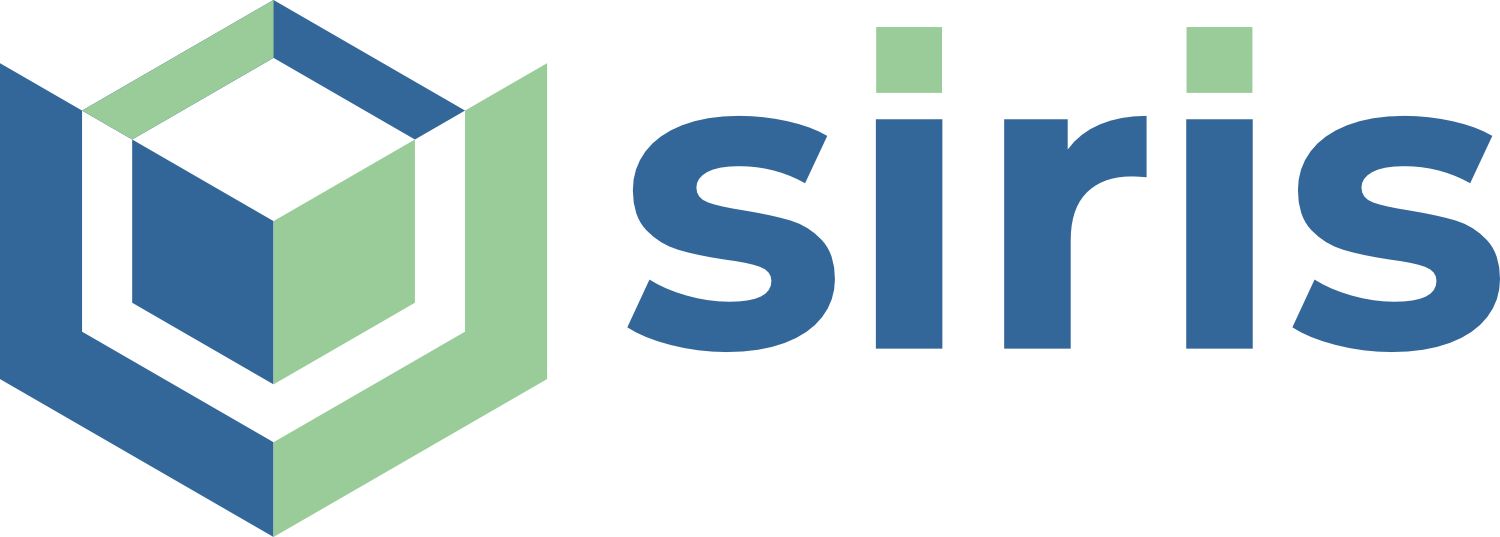




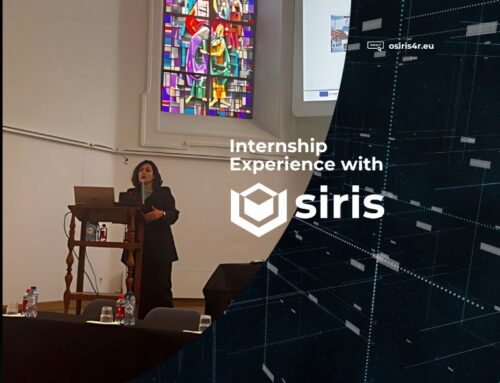
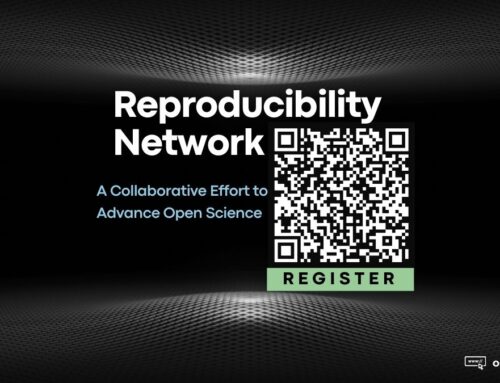



Keep In Touch